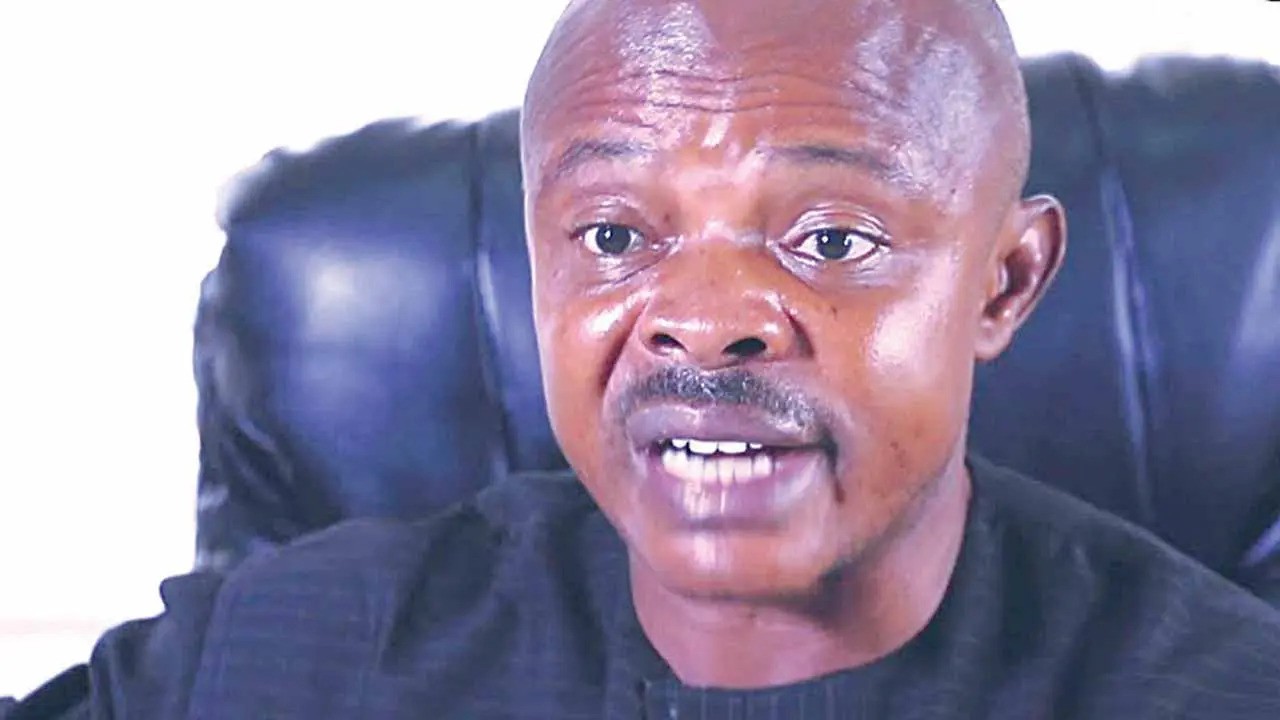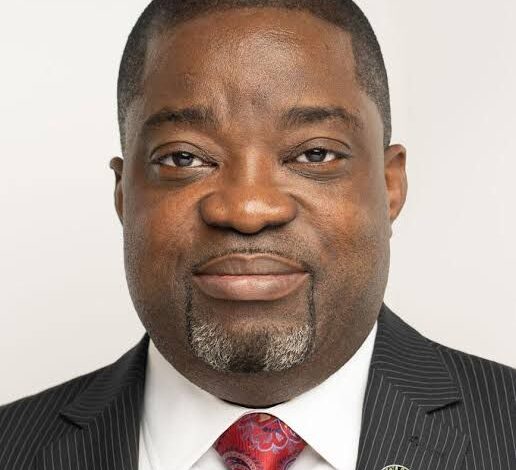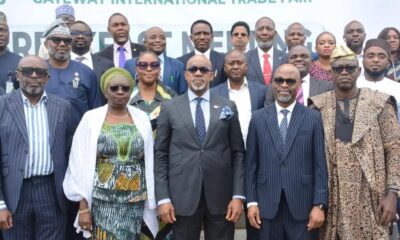Top Story
Ogun debunks report on FG refusal to pay COVID-19 reimbursement
Bankole Taiwo, Abeokuta
The Ogun State Government has described as blatant falsehood, a news report which claimed that the Federal Government refused to make COVID-19 reimbursement to the state because of pervasive corruption.
In a statement issued by the Chief Press Secretary to Ogun State Governor, Mr. Kunle Somorin, the State Government said that contrary to the insinuations in the fake report, the Nigeria COVID-19 Action Recovery & Economic Stimulus (NG-Cares) programme is not a COVID-19 intervention but a post-COVID economic stimulus packaged for poor and vulnerable people in the society, as well as Micro, Small & Medium Enterprises (MSMEs) that were most negatively affected by the pandemic in terms of disruptions to livelihoods and businesses respectively, adding that the states that had been reimbursed so far are only the first set of beneficiaries.
Somorin said the so-called bombshell report is mere comedy taken too far, as the authors decided to hold brief for the Federal Government without doing basic research.
Somorin added that the verification exercise is continuous and all eligible Ogun State Government post-COVID economic stimulus and related expenditures would be captured and adequately reimbursed in subsequent verification exercises, as each state of the Federation is eligible to receive up to $20million.
Tracing the origins of the programme, Somorin said, “The NG-Cares Program, funded by the World Bank, was originally designed as a loan to the 36 states.
“However, given the level of investments and costs expended by Ogun State during the COVID-19 pandemic, including but not limited to investments in healthcare facilities and palliatives to ameliorate the suffering experienced by Ogun citizens at the time, and other subsequent socio-economic interventions such as Okowo-Dapo for women, employment of artisans for affordable housing construction, maintenance of public roads and planting materials palliatives for farmers, the Ogun State government decided not to take further loans.
“However, due to various engagements by the 36 states with the Federal Government and the World Bank on the need to re-structure the funding of the Program, the NG-Cares Program was recently changed to a Performance for Results (PfR) Grant program, and so the reimbursements to State Governments announced were the eligible expenses incurred and validated during the first verification exercise.”
According to him, at no time did the Ogun State Government lower the standards in its management of post COVID-19 intervention programmes, describing the authors of the report as political failures desperate for attention.
He added that the efforts of Ogun State, the first to record the index case in Nigeria, in the management of COVID-19 is second to none, adding that Ogun was the first to put a state-owned molecular laboratory in place during the pandemic, coupled with the various degrees of isolation centers in strategic locations of the state, including Olabisi Onabisi Onabanjo University Teaching Hospital ( OOUTH), Sagamu, Model School Ikenne, General Hospital, Iberekodo, among other ones which were donated by private individuals.
According to him, the system put in place by the Prince Dapo Abiodun led government to manage the pandemic was inspected by the then Director General of Nigeria Centre for Disease Control (NCDC), Dr. Chike Ihekweazu and the Country Director of World Health Organisation (WHO), Dr. Fiona Braka, both of whom lauded the State Government for giving direction to other states on how to deal with the pandemic.
“Even the then Minister of State for Health, Dr. Olorunibe Mamora, during his visit to Abeokuta in March 2021, expressed satisfaction with the response activities of Ogun State to COVID-19, saying that the State has done excellently well.
“Ogun State, it would be recalled won several awards for its proactiveness for the management of the pandemic and was adjudged the overall best performing State on Routine Immunisation (RI) and COVID-19 Vaccination by the National Primary Health Care Development Agency (NPHCDA).
“Governor Abiodun is a man known to be committed to putting a round peg in a round hole without giving room for anything less than the best.”
Speaking on the distribution of palliatives during the pandemic, the statement debunked the allegation of corruption in the exercise saying, “The Governor set up an inter-ministerial committee, which was a task force in charge of palliatives and enforcing compliance during and after the lockdown. The Secretary to the State Government was at no time in charge of procurement in relation to COVID-19 just as it is worthy of note that no political appointees took COVID-19 palliatives as his or her private items for personal use.
“The CACOVID items were distributed based on the instructions of the donors, and our papers are there as proofs of how the distributions were done.
“The naysayers only brought the figments of their imaginations to the public space to ridicule themselves. We therefore advise the public to ignore these lies as our government remains committed to transparency and accountability in the efforts to fulfil our avowed electoral promises,” he said.
Top Story
Minimum wage negotiations hit deadlock as Labour Unions reject FG’s proposed N48,000


…FG’s proposal an insult to Nigerian workers — NLC President
…Fulfill your promise to Nigerian workers — Ajaero tasks Tinubu on living wage pledge
By our correspondents
The Tripartite National Minimum Wage meeting resumed on Wednesday, but negotiations reached a deadlock due to the government’s perceived unwillingness to engage in fair discussions with Nigerian workers.
The Nigeria Labour Congress (NLC) and Trade Union Congress (TUC) expressed deep disappointment and frustration at the turn of events.
According to NLC National President, Joe Ajaero, the government’s proposal of N48,000 as the new minimum wage is an insult to Nigerian workers.
Ajaero stated that despite their best efforts to reach a reasonable agreement, the government and organised private sector’s actions have led to a breakdown in negotiations.
The labour unions are demanding a higher minimum wage to reflect the current economic realities and alleviate the suffering of Nigerian workers. The stalemate in negotiations may lead to industrial action, which could have far-reaching consequences for the economy.
He said, “Government’s proposal of a paltry N48,000 (forty-eight thousand Naira) as the Minimum Wage does not only insult the sensibilities of Nigerian workers but also falls significantly short of meeting our needs and aspirations.”
Ajaero noted that in contrast, the Organised Private Sector proposed an initial offer of N54,000.
“Though it is worth noting that even the least paid workers in the private sector receive N78,000 as clearly stated by the OPS, highlighting the stark disparity between the proposed minimum wage and prevailing standards further demonstrating the unwillingness of Employers and Government to faithfully negotiate a fair National Minimum Wage for Workers in Nigeria.
“Furthermore, the Government’s failure to provide any substantiated data to support their offer exacerbates the situation. This lack of transparency and good faith undermines the credibility of the negotiation process and erodes trust between the parties involved.
“As representatives of Nigerian workers, we cannot in good conscience accept a wage proposal that would result in a reduction in income for federal-level workers who are already receiving N30,000 (thirty thousand Naira) as mandated by law, augmented by Buhari’s 40 percent Peculiar allowance (N12,000) and the N35,000 wage award, totalling N77,000 only. Such a regressive step would undermine the economic well-being of workers and their families and is unacceptable in a National Minimum Wage Fixing process.”
Ajaero stated that the Labour Unions were forced to withdraw from the negotiations due to the government’s unsatisfactory proposal, but he emphasised that the Congress remains steadfast in its commitment to fighting for the rights and interests of Nigerian workers.
“In light of these developments, and to prevent the negotiation of a wage deduction, the Nigeria Labour Congress and Trade Union Congress have decided to walk out of the negotiation process. We remain committed to advocating for the rights and interests of Nigerian workers and will continue to engage in reasonable dialogue with the Government if they show serious commitment to find a fair and sustainable resolution to this impasse.”
He also called upon the Government to reconsider its position and come to the negotiation table with, “clear hands that reflect the true value of the contributions made by Nigerian workers to the nation’s development and the objective socioeconomic realities that confront not just Nigerian workers but Nigerians today as a result of the policies of the federal government.”
…President Tinubu must fulfill pledge of ensuring a living wage for Nigerian workers — NLC President
He further urged the government to work alongside Labour to finalise the N615,000 minimum wage as proposed by Labour.
“Together, in a reasonable dialogue, we can work to give Nigerian workers an N615,000 National Minimum wage as proposed by us based on evidence and Data. This will be in keeping with the pledge of the President; his Excellency Senator Bola Ahmed Tinubu’s pledge to ensure a Living wage for Nigerian workers.”
Recall that on January 30, 2024, President Bola Tinubu, conveyed by Vice-president Kashim Shettima, addressed a 37-member panel at the Council Chamber of the State House in Abuja.
This panel, comprising representatives from federal and state governments, the private sector, and organised labour, is tasked with recommending a new national minimum wage for Nigeria. Shettima emphasised the importance of swift deliberations, urging members to expedite the process and submit their reports promptly.
“This timely submission is crucial to ensure the emergence of a new minimum wage,” Shettima said.
VP Shettima also urged collective bargaining in good faith, emphasising contract adherence and encouraging consultations outside the committee.
The 37-man committee is chaired by the former Head of the Civil Service of the Federation, Goni Aji.
The committee had the terms of reference to ‘consult all stakeholders on the issue of national minimum wage and recommend a realistic and practical national minimum wage to the government.’
The Nigeria Labour Congress (NLC) and Trade Union Congress (TUC) have proposed various figures as a living wage for workers across the country.
This was made known during zonal public hearings held simultaneously on March 7, 2024, in six locations – Lagos, Kano, Enugu, Akwa Ibom, Adamawa, and Abuja.
According to reports, the NLC and TUC proposed different figures for each zone, citing the current economic realities and the need for a living wage. In the South-West, the NLC proposed N794,000, while the TUC suggested N447,000.
In the North-Central zone, workers demanded N709,000 as the new national minimum wage, while the South-South stakeholders proposed N850,000. In the North-West, N485,000 was proposed, and in the South-East, stakeholders demanded N540,000 as the minimum wage.
After considering the various proposals, the Organised Labour is set to recommend N615,000 as the new living wage for Nigerian workers. This move is aimed at ensuring that workers earn a wage that reflects the current economic realities and enables them to meet their basic needs.
The proposal is expected to be presented to the government for consideration and implementation.
Top Story
Foreign remittances: CBN grants license to 14 IMTOs


As part of concerted efforts to increase the foreign-currency remittance inflow, the Central Bank of Nigeria (CBN) has granted licenses to 14 new International Money Transfer Operators (IMTOs).
The licenses which are Approval-in-Principle (AIP) were disclosed in Abuja on Wednesday by the Bank’s Acting Director of Corporate Communications, Mrs. Hakama Sidi Ali.
The Bank argues that the initiative will help increase the sustained supply of foreign exchange in the official market by promoting greater competition and innovation among IMTOs to lower the cost of remittance transactions and boost financial inclusion.
According to the Apex Bank, “This will spur liquidity in Nigeria’s Autonomous Foreign Exchange Market (NAFEX), augmenting price discovery to enable a market-driven fair value for the naira.”
It will be recalled that the CBN Governor, Mr. Olayemi Cardoso, had recently declared, “We’ve set ourselves a target to double remittance flows into Nigeria within a year, a goal I firmly believe is within reach.
“We are wasting no time driving progress to remove any bottlenecks hindering flows through formal channels permanently. We have a determined pathway and a sequenced approach to tackling all challenges ahead, working hand in hand with key stakeholders in the remittance industry.”
The Apex Bank also viewed increasing formal remittance flows— one of the major sources of foreign exchange, accounting for over 6 percent of GDP—as a means of reducing the historical volatility in Nigeria’s exchange rate caused by external factors, such as fluctuations in foreign investment and oil export proceeds.
The increase in the number of IMTOs is one of the primary actions initiated by the CBN’s remittance task force, overseen by Governor Cardoso as a collaborative unit pulling together specialists to work closely with the private sector and market operators to facilitate the ease of doing business in the remittance ecosystem in Nigeria.
The task force was established as a direct result of an executive learning session with IMTOs during the World Bank/IMF Spring Meetings held in Washington DC, United States of America, in April 2024.
The task force will meet regularly to implement strategy and monitor the impact of its measures on remittance inflows.
Top Story
He was an armour bearer – Sanwo-Olu mourns late aid at 55


By Sodiq Adelakun
The Lagos State Government has announced the passing of its Deputy Chief of Staff, Mr. Gboyega Soyannwo.
According to a statement signed by the Commissioner of Information and Strategy, Mr. Gbenga Omotoso, Soyannwo died on Wednesday after a brief illness at the age of 55.
Governor Babajide Sanwo-Olu expressed his condolences to the Soyannwo family, describing the late Deputy Chief of Staff as a “brother and a servant of the people.
According to the statement, “In deep sorrow, the Lagos State Government announces the passing of the Deputy Chief of Staff (DCoS) to Mr. Governor, Mr. Gboyega Soyannwo.
“Soyannwo died today after a brief illness. He was 55.
“Mr. Governor, Babajide Sanwo-Olu, on behalf of the Government and people of Lagos, sends his condolences to the Soyannwo family.
“I have lost a brother and a servant of the people,” Mr. Governor said while breaking the news to the Executive Council (EXCO) meeting,
“After a minute’s silence in respect of the late DCoS, Mr. Governor ended the EXCO meeting.”
The late Gboyega Soyannwo is survived by a wife and two children.
-
Finance4 months ago
Court orders Sen. Victor Umeh to repay N136m bank debt to AMCON
-



 Abuja Update3 months ago
Abuja Update3 months agoUNDP, FG partnership needed to achieve inclusion, equity- Minister
-
capital market2 years ago
Rt.briscoe, FBNH, Others halts negative performance of stock market
-
Abuja Update2 months ago
Banks drive stock market performance with N147bn gain
-



 Health1 month ago
Health1 month agoCapacity training will reduce migration of health workers- NPHCDA
-



 Business3 weeks ago
Business3 weeks agoTingo Group unveils Tingo Electric, Tingo Cola drink at Lagos launch
-
Submission Guidelines4 months ago
CALL FOR SUBMISSIONS: POETRY COLUMN-NND
-
News4 months ago
Oil thieves sponsoring malicious media campaign against Navy – Spokesman
















